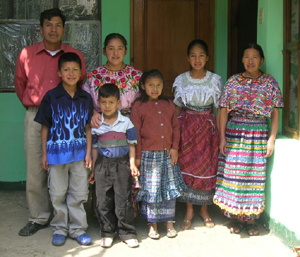K'iche': Difference between revisions
imported>Joe Quick mNo edit summary |
imported>Joe Quick No edit summary |
||
| Line 1: | Line 1: | ||
[[Image:Kiche.jpg|frame|K'iche' family at their home in San Andrés Xecul, Totonicapan]] | |||
[[ | The '''K'iche' ''' (or '''Quiché''') are one of the largest ethnic groups in [[Guatemala]]. They are ethnically [[Maya peoples|Maya]] and live primarily in the highlands to the north and the west of Lake Atitlán, primarily in the departments of [[Quetzaltenango (department)|Quetzaltenango]], [[Totonicapán (department)|Totonicapan]], and [[Quiché (department)|El Quiché]]. | ||
'''K'iche' ''' also denotes the [[Quiché language|traditional language]] of the K'iche' people. This language is still spoken in most K'iche' communities, but many community members also speak Spanish and some do not speak K'iche' at all. | '''K'iche' ''' also denotes the [[Quiché language|traditional language]] of the K'iche' people. This language is still spoken in most K'iche' communities, but many community members also speak Spanish and some do not speak K'iche' at all. | ||
| Line 7: | Line 7: | ||
== History == | == History == | ||
The [[Popol Vuh]], sometimes called the "Maya Bible," gives us the early history of the K'iche' through the words of several members of the colonial K'iche' elite. | |||
The K'iche' first made contact with the Spanish conquistadors in 1523, with the arrival of an expeditionary force led by [[Pedro de Alvarado]]. | |||
Colonial history | |||
Modern History | |||
== Religion == | == Religion == | ||
Traditional Maya religious custom, or ''costumbre'', is a [[Syncretism|syncretic]] conglomeration of pre-Columbian traditions and Catholicism. It combines devotion to the Catholic saints and celebrations of the Catholic festivals with traditional dances and elaborate ceremonies conducted at ceremonial sites | Traditional Maya religious custom, or ''costumbre'', is a [[Syncretism|syncretic]] conglomeration of pre-Columbian traditions and Catholicism. It combines devotion to the Catholic saints and celebrations of the Catholic festivals with traditional dances and elaborate ceremonies conducted at ceremonial sites that are scattered throughout the surrounding mountains. | ||
Evangelical Protestantism has become increasingly strong since its arrival in the region in the 1970s. | Evangelical Protestantism has become increasingly strong since its arrival in the region in the 1970s. | ||
| Line 17: | Line 24: | ||
As in many Maya groups, clothing carries a lot of meaning for the K'iche'. | As in many Maya groups, clothing carries a lot of meaning for the K'iche'. | ||
Women | |||
[[Category:Anthropology Workgroup]] | [[Category:Anthropology Workgroup]] | ||
Revision as of 19:14, 18 January 2007
The K'iche' (or Quiché) are one of the largest ethnic groups in Guatemala. They are ethnically Maya and live primarily in the highlands to the north and the west of Lake Atitlán, primarily in the departments of Quetzaltenango, Totonicapan, and El Quiché.
K'iche' also denotes the traditional language of the K'iche' people. This language is still spoken in most K'iche' communities, but many community members also speak Spanish and some do not speak K'iche' at all.
History
The Popol Vuh, sometimes called the "Maya Bible," gives us the early history of the K'iche' through the words of several members of the colonial K'iche' elite.
The K'iche' first made contact with the Spanish conquistadors in 1523, with the arrival of an expeditionary force led by Pedro de Alvarado.
Colonial history
Modern History
Religion
Traditional Maya religious custom, or costumbre, is a syncretic conglomeration of pre-Columbian traditions and Catholicism. It combines devotion to the Catholic saints and celebrations of the Catholic festivals with traditional dances and elaborate ceremonies conducted at ceremonial sites that are scattered throughout the surrounding mountains.
Evangelical Protestantism has become increasingly strong since its arrival in the region in the 1970s.
Clothing
As in many Maya groups, clothing carries a lot of meaning for the K'iche'.
Women
